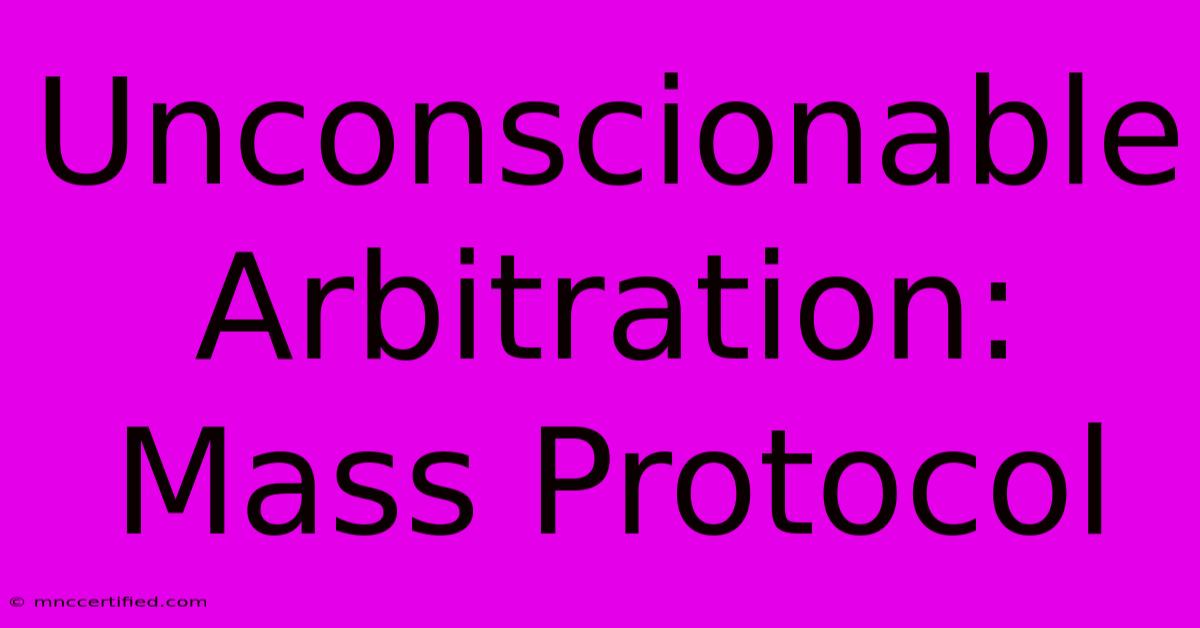Unconscionable Arbitration: Mass Protocol

Table of Contents
Unconscionable Arbitration: Navigating the Mass Protocol Maze
The rise of decentralized finance (DeFi) has brought with it innovative solutions and novel challenges. One such challenge is the increasing prevalence of arbitration clauses within smart contracts, specifically within protocols like Mass Protocol. While arbitration offers a seemingly efficient dispute resolution mechanism, concerns regarding unconscionable arbitration clauses are rising, demanding careful examination. This article delves into the complexities of unconscionable arbitration within the Mass Protocol context, exploring its implications and potential remedies.
Understanding Mass Protocol and its Arbitration Clauses
Mass Protocol, a [brief, neutral description of Mass Protocol - replace bracketed information with accurate details], often incorporates arbitration clauses within its smart contracts. These clauses dictate that disputes arising from the protocol's use will be resolved through arbitration rather than traditional court litigation. While arbitration can be quicker and potentially less expensive than court proceedings, the terms of these clauses can be crucial. Unconscionable arbitration clauses, which are deemed unfairly one-sided or oppressive, are a major concern.
What Constitutes an Unconscionable Arbitration Clause?
An arbitration clause can be deemed unconscionable if it displays significant procedural or substantive unfairness. Procedural unconscionability refers to the circumstances surrounding the agreement, such as unequal bargaining power, lack of meaningful choice, or hidden or unclear terms. Substantive unconscionability focuses on the terms themselves, assessing whether they are overly harsh, one-sided, or create an unreasonable imbalance of rights and obligations. In the context of Mass Protocol, a clause might be considered unconscionable if it:
- Limits the types of claims that can be arbitrated: Restricting claims related to fraud or serious breaches of contract could be deemed unconscionable.
- Favors one party excessively: Clauses that heavily favor the Mass Protocol developers or other significant parties over users are problematic.
- Imposes excessive costs or fees: Arbitration fees that are prohibitively expensive can effectively prevent users from pursuing legitimate claims.
- Limits discovery or evidence presentation: Restrictions on accessing crucial information or presenting evidence can significantly undermine a user's ability to make their case.
- Lacks a clear and easily understandable process: Ambiguous or complex language makes it difficult for users to understand their rights and obligations, contributing to unconscionability.
Identifying and Addressing Unconscionable Arbitration in Mass Protocol
Identifying unconscionable arbitration requires careful review of the specific terms within the Mass Protocol smart contracts. Users should consult with legal professionals specializing in blockchain technology and smart contract law to assess the fairness of the clauses.
Potential Legal Remedies
If an arbitration clause is found to be unconscionable, several legal remedies might be available, depending on jurisdiction and specific circumstances. These could include:
- Challenging the enforceability of the entire clause: A court may refuse to enforce the arbitration clause altogether, allowing the dispute to proceed through traditional litigation.
- Severing the unconscionable portion of the clause: The court might remove only the unfair parts of the clause, leaving the remaining, reasonable terms in effect.
- Reforming the clause to make it fair: The court could modify the clause to address the unconscionable aspects and make it more equitable.
The Importance of Transparency and User Protection in DeFi
The prevalence of unconscionable arbitration clauses highlights a critical need for greater transparency and user protection within the DeFi ecosystem. Protocols like Mass Protocol should prioritize clear, fair, and accessible terms in their smart contracts. Furthermore, regulatory bodies are beginning to address these concerns, emphasizing the need for robust mechanisms to protect users from exploitative contract terms.
Keywords: Unconscionable Arbitration, Mass Protocol, DeFi, Smart Contracts, Arbitration Clauses, Procedural Unconscionability, Substantive Unconscionability, Blockchain Law, Legal Remedies, User Protection, Transparency in DeFi.
Note: This article provides general information and should not be considered legal advice. Users should consult with legal professionals to assess their specific circumstances and rights regarding arbitration clauses within Mass Protocol or any other DeFi platform. Remember to replace the bracketed information with accurate details about Mass Protocol. This is a template and requires factual information to be fully effective. Consider adding links to relevant legal resources or academic articles.

Thank you for visiting our website wich cover about Unconscionable Arbitration: Mass Protocol. We hope the information provided has been useful to you. Feel free to contact us if you have any questions or need further assistance. See you next time and dont miss to bookmark.
Featured Posts
-
Insurance Companies Saginaw Mi
Nov 27, 2024
-
Is Fidelis Care Good Insurance
Nov 27, 2024
-
Insurance Companies Gadsden Al
Nov 27, 2024
-
Arbitration Live Nations Ticketmaster Defense
Nov 27, 2024
-
Classic Car Insurance Michigan
Nov 27, 2024